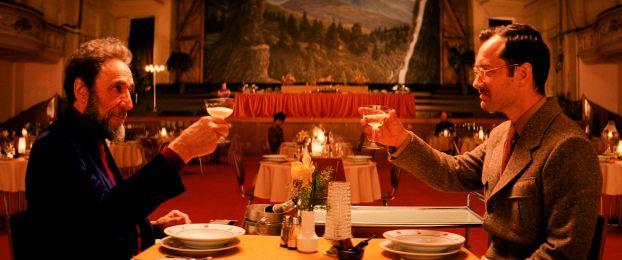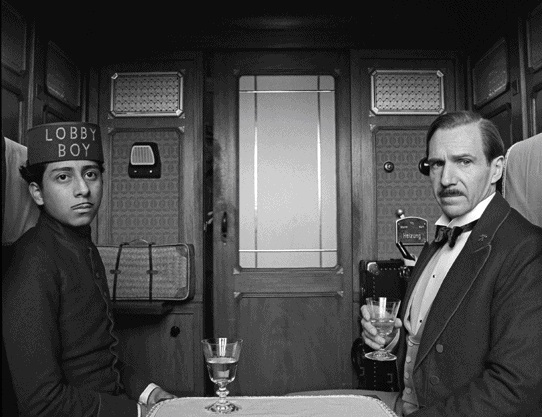“Do it—and bring a bottle of the Pouilly-Jouvet ’26 in an ice bucket with two glasses so we don’t have to drink the cat-piss they serve in the dining car.”
It should not be surprising that a film about a luxury hotel features a few wine cameos. Nor should it be surprising that a comedy should make a joke of them. Wes Anderson’s The Grand Budapest Hotel more than delivers on both counts, and his characters’ stilted dialogue seems tailor-made for subtle wine farce. Characters pronounce wine names ridiculously, with baroque flourishes, only to quickly bury them under more talk. You have to be fast enough to catch the name, and faster still to catch that the name was actually a joke. This quirk makes Grand Budapest an oddly respectful film about connoisseurship—a certain amount of taste is required to comprehend what’s funny in the first place.
In Grand Budapest, Anderson rarely mentions a wine directly. He instead creates his own kind of ‘wine talk,’ fragmenting the obscure jargon of wine names, regions and styles, and stringing together passwords comprehensible only to the initiated. In an early scene, the owner of The Grand Budapest orders a red wine whose name I was not quick enough to catch, and then “a split of the brut.” Not a split of Champagne, nor a half-bottle of Pol Roger, Billecart Salmon Rosé, or Whatever Whatever. The former would have been obvious, and the second amateurishly showy. ‘A split of the brut’ delights in the absurdity of the language, its implied, abstracted violence (to cleaver a beast?) that can hardly be linked to that tiny bottle of dry Champagne. The server even brings a comically itty-bitty sample glass. Most sparkling wines are made dry, or ‘brut,’ and say so right on the label. As we rarely refer to a wine this way, (“I’ll have the brut”) the term slips under the surface of the cultural consciousness, its use reserved for eccentric experts.
A little later in the film, I wondered if Anderson had started to make things up. M. Gustave, the film’s intrepid concierge, demands a bottle of Pouilly Jouvet. I’m sorry—of Pouilly-Fuisse? A world-class Chardonnay from Burgundy, in Northeast France? Or Pouilly-Fumé, the renowned Sauvignon Blanc wines from the Loire river valley a little to the west? Is that what he meant by cat-piss– are they serving a cheaper Sauvignon Blanc in the dining car, maybe from South Africa or New Zealand? (Of course not, this is a period piece!) Going back to the script, he does in fact call for a Pouilly-Jouvet. A quick Internet search returned an answer that nicely fits Anderson’s nostalgic phantasmagoria.
At Allexperts.com, ‘John’ posted an inquiry to a ‘wine expert,’ asking if he knew of a Jouvet Pouilly-Fuisse, “an excellent wine but did not Bankrupt the vault [sic.]” In the mid seventies, it was about $10-15 dollars in a restaurant, and $9 to $10 in a store. Presumably restaurant mark-ups were much tamer then, although according to inflation calculators, a $10 bottle of wine would cost equivalently $43 now. The expert responds that Jouvet disappeared in the ‘80s, much like the Grand Budapest Hotel is supposed to have closed, sometime after the author-character visits in the late sixties, but before he wrote about the hotel in the mid eighties. Which is about the time young couples enjoyed bottles of Jouvet Pouilly-Fuisse in New York, an affordable luxury recalling a lost, less-modern Europe. The Tenenbaum children had probably just been born.
The Pouilly-Jouvet namelessly re-emerges near the end of the film, when M. Gustave, the owner’s younger self, and the owner’s wife repeat the train trip where they had first brought it. Before, police thugs hindered the owner and M. Gustave, but this time the scene is shot in black and white, there are real SS, and M. Gustave is arrested and assassinated off-screen. But not before the script directs him to throw his glass of wine into the face of his executors.
In Anderson’s world, wine is flamboyant but innocent, like M. Gustave, and the hotel itself. As M. Gustave and the hotel owner dually put it, “there are faint glimmers of civilization left in this barbaric slaughterhouse that was once known as humanity.” Wine is an absurd protest against militarism, modernism, and whatever else you can say Anderson’s Nazis represent. Yet its absurdity makes its resistance all the more potent. A happy indulgence, fine wine can neither integrate with modernity nor its mercenary expediency, and is lost to time instead.
————————-
This post is the first in a continuing column, What Were They Drinking?!, featured on The Nightly Glass, and occasionally co-posted here on The Hooded Utilitarian. I also wrote a longer piece on service in The Grand Budapest Hotel here.


I disagree with the tag line for this piece (I know its my piece) “Wes Anderson, wine snob…” The movie is partly about a snob, and while some of the humor is exclusive to people who know about wine, (thus, snobbish,) Anderson is also making fun of the jargon by rearranging the terms rather casually.
Whoops! You can always email me if there’s a problem like that; I may be clueless, but I am open to correction. What should I change the tagline to?
The “cat piss” diss brought me back to Bill Murray’s “uh, pour it over here, please. He doesn’t know anything about wine” remark from The Life Aquatic.
That’s a good moment, Michael– I’m looking forward to seeing Life Aquatic again, and maybe talking about doing wine.
Noah, Jacob said there’s a magical way I can go in and change it… will toggle around with it tomorrow.
Another joke is that it takes place in the nation of ?ubrówka, the name of the Polish bison grass flavoured vodka, coincidentally my favourite.
Pingback: Parallax ViewThe View Beyond Parallax… more reads for week of April 4 » Parallax View
I think Mr. Moustafa ordered Bichot ’52 which is a very old label. The bottle is a burgundy (sloped shoulder).
Mary– Fantastic! I’m excited to read up on Bichot. Thank you for catching that and posting the name here.
Pingback: Movie Review: The Grand Budapest Hotel –